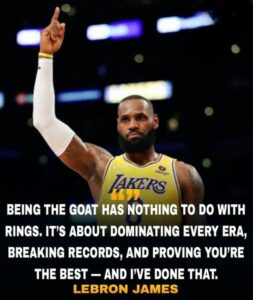LeBron James, widely regarded as one of the greatest basketball players of all time, has never been shy about his place in the sport’s history. But his latest statement has reignited one of the most heated debates in basketball culture — what truly defines the “GOAT” (Greatest of All Time)?

Speaking confidently, LeBron declared, “Being the GOAT has nothing to do with rings. It’s about dominating every era, breaking records, and proving you’re the best — and I’ve done that.”
His message is clear: for him, greatness isn’t just measured by the number of championships won, but by overall dominance, consistency, and the ability to transcend generations.
Why This Statement Hit a Nerve
In the basketball world, championship rings have long been considered the ultimate currency of greatness. Michael Jordan’s six NBA titles are often the first line of defense for those arguing against LeBron’s GOAT status. For decades, fans, analysts, and players alike have used titles as the main metric to compare legends.
By downplaying the importance of rings, LeBron challenges a deeply ingrained narrative — one that could change how future generations measure success in the NBA.
The Stats Behind LeBron’s Case
There’s no denying LeBron’s résumé is staggering:
-
Four NBA Championships (2012, 2013, 2016, 2020)
-
Four MVP Awards (2009, 2010, 2012, 2013)
-
All-time leading scorer in NBA history
-
19 All-Star selections and counting
-
10 NBA Finals appearances
In terms of longevity and versatility, LeBron’s career stands in rare company. He has dominated in three different decades, adapting his game to different styles of play while remaining among the league’s top performers.
The Critics’ Perspective
However, his comments have also fueled his detractors. Critics argue that LeBron’s claim shifts the goalposts in his favor. For them, Jordan’s perfect 6-0 Finals record remains untouchable, and Bill Russell’s 11 championships will forever be a benchmark for greatness.
Some fans have taken to social media, calling LeBron “overhyped, overprotected, overrated” — pointing to instances where they believe the league has favored him in officiating and media narratives.
This criticism reflects a broader cultural divide: younger fans, who grew up watching LeBron dominate, tend to embrace his definition of greatness. Older generations often stick to the traditional “rings above all” mindset.
Redefining the GOAT Criteria
LeBron’s statement also reflects a shift in how we value players in the modern NBA. In today’s era, individual achievements, advanced analytics, and overall impact on and off the court carry more weight.
His influence extends beyond the hardwood — from his philanthropic work with the LeBron James Family Foundation to his role in producing media content that shapes cultural conversations. To his supporters, this broader impact only strengthens his GOAT case.
The Bigger Picture
Whether one agrees with LeBron or not, his comments highlight a deeper question: is greatness defined by a single metric, or should it be viewed as a combination of dominance, influence, and legacy?
The answer might never be universally accepted. What’s clear, however, is that LeBron James has ensured his name will remain central to the GOAT debate for years to come.
As he continues to break records and extend his career deep into his 30s, his narrative — rings or no rings — will keep shaping how future basketball legends are judged.
Conclusion
LeBron James has never been afraid to speak his truth, and his latest statement is no exception. By challenging the traditional definition of greatness, he forces fans to reconsider what being the GOAT really means.
Whether you believe his legacy surpasses Jordan’s or not, one thing is certain: when the story of basketball’s greatest players is told, LeBron’s chapter will be one of the most compelling — and most debated — in sports history.